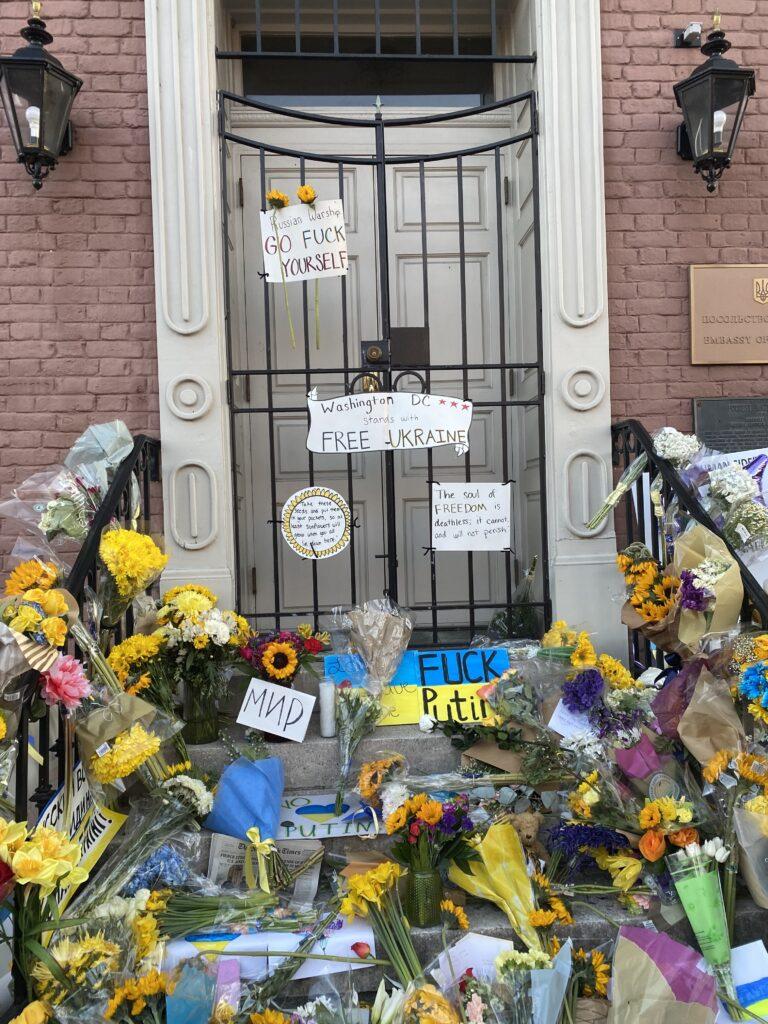The future of Ukraine’s sovereignty is inextricably linked to United States foreign policy, panelists said at a March 22 event.
The event, titled “War in Ukraine: What Next?”, featured international affairs experts, who discussed potential outcomes of Russia’s invasion of Ukraine and how other countries can promote peace.
Georgetown University’s department of government and Lannan Center for Poetics and Social Practice hosted the event as a part of this year’s Lannan Symposium, “Beyond Identity: Reimagining the American Narrative.”
While the conclusion of the conflict remains far off and uncertain, Russia’s inability to lessen financial restrictions supports the likelihood that Ukraine will maintain its sovereignty, according to José María Argueta, former ambassador and permanent representative of Guatemala to the Organization of American States (OAS).

OAS is an international organization that was founded in 1948 to promote solidarity and security among its member states in the Americas.
“In my mind, there are three scenarios: Putin wins, Ukraine wins, or there is a frozen long-term war,” Argueta said at the event. “However, I do not believe that Russia has the economic capacity to support a long stalemate. Time is on the side of the Ukranians. If I were to choose one of three potential scenarios, I would go with Ukraine winning.”
Russian president Vladimir Putin launched a full-scale and unprovoked invasion of Ukraine on Feb. 24, prompting the biggest military conflict in Europe since World War II. Since the invasion, 6.5 million Ukrainians have been displaced inside Ukraine, and 3.6 million Ukrainians have fled the country altogether.
Western nations and North Atlantic Treaty Organization (NATO) members must decide between interventionist or isolationist foreign policies, according to Mark Muller, senior mediation advisor to the United Nations (UN) Department of Political Affairs and UN special envoy to Syria.
“The fundamental question for European policymakers is whether or not you build a peace process around a Yalta-type solution, which is a recognition of spheres of influence, or whether you build it around the Helsinki Act-type approach of 1975, in which you recognize that every state is a sovereign state with the right to determine its own future and policy arrangements,” Muller said. “I don’t believe at this stage that the West has fundamentally answered this question.”
The Yalta Conference was a February 1945 meeting of the leaders of the United States, the United Kingdom, France and the Soviet Union to discuss the post-World War II reorganization of Germany and broader Europe.
The Helsinki Final Act was an agreement that 35 nations signed in August 1975, recognizing all borders in Central and Eastern Europe established since World War II.
The American value of democracy must be reevaluated and solidified to inform foreign policy, according to Tim Phillips, founder and CEO of Beyond Conflict, an international nonprofit organization that works toward conflict resolution and reconciliation around the world.
“Negotiation — this could happen between Russia and Ukraine, or Russia and the West,” Phillips said. “But there should be another negotiation within the United States about what we mean by democracy. What is it to have a democracy that represents the diversity of this nation? This is not the democracy of when the Cold War began or ended. If we are going to defend democracy, the negotiation has to start at home and not just in Europe.”
Currently, 32% of Americans say the United States is providing about the right amount of support to Ukraine, while 42% say the United States should provide more support to Ukraine, according to a March Pew Research Center survey.
Putin and his actions do not fully represent the Russian people, according to Argueta.
“This is Putin’s aggression. This is Putin’s invasion,” Argueta said. “Dictators do not reason from the national interest perspective; they reason from their personal interest perspective and from that of their enablers. Do not refer to what you are seeing as Russian aggression. Russian people are not the enemy. Putin and his enablers are the enemy.”
Putin has led Russia for 16 years and signed legislation allowing him to potentially stay in power until 2036. His public support rests on falsehoods propagated by state-controlled media and fear of the oppressive government.
People around the world should consider their role in supporting Ukraine and realize the impact of various possible outcomes, according to Argueta.
“Regarding the three potential outcomes of Putin winning, Ukraine winning, or a frozen war, I want professors and students to start thinking of what are the implications of each of those outcomes in each of their regions of expertise,” Argueta said. “What does it mean for Asia, Africa, Latin America?”




















